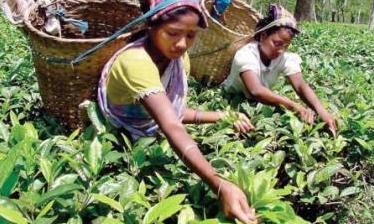The factors leading to the present crisis in Assam State’s tea industry include below average production, inferior quality of tea produced in a large number of factories, poor price realisation and failure to make reasonable profit, among others.
Moreover, unwillingness of a sizeable number of the children of the tea garden workers to work in the traditional fashion in the tea estates (TEs) has also emerged as a major factor in this respect, said a veteran tea planter Pranab Kumar Sarma.
Some other factors are also afflicting the tea industry nowadays. These factors include the water-related woes like drought-like situations, flood, water-logging and erosion due to high intensity rainfall, etc., triggered by the phenomenon of climate change and railway culverts with inadequate openings, among others.
The big tea estates are facing low production because of the age of their tea bushes, their failure to properly follow the cultural operations recommended by the Tea Research Association (TRA), indiscriminate use of agro-chemicals, soil degradation etc.
Many countries reject the teas that contain pesticide residue beyond the maximum limit of pesticide residue acceptable to them. But as the expenditure incurred by the TEs here vary between Rs 4,000 and Rs 15,000 per hectare or more, it becomes clear that in some of our TEs, high quantity of pesticide is used.
The tea industry should bring this situation under control and for the purpose, an instrument may be used by them to determine the pesticide residue in the green tea leaves, either at the garden level or on arrival at the factory, in conformity with the Plant Protection Code approved by the Tea Board of India. This will help Assam Tea regaining, or, strengthening its competitiveness in the global market.
Experts are there at the IIT Guwahati, who can develop such machines. Moreover, considering the growing shortage of workers, he said that the tea estates may also go for introducing sensored plucking machines whenever needed. Technical expertise to develop such devices is available in the State. However, since the working force cannot be reduced, the mechanized devices should be developed in such a way so that about seven pluckers per hectare are required, he said.
Sarma, who is associated with tea plantation for the past over four decades, said the new generation of the tea garden workers are not interested to work in the old style and they are loathing the ways wages are fixed by the industry and the workers’ union. They prefer to take up jobs outside the garden and the industry is thus losing the most productive section of the people, who belong to the age group of 18 years to 35 years. At present there are seven lakh permanently employed workers and an equal number of temporarily engaged workers in the State’s tea estates.
Many children of the tea workers go for higher education and other jobs they consider to be lucrative and honourable.
[Deb Boruah with inputs from Media sources.]
